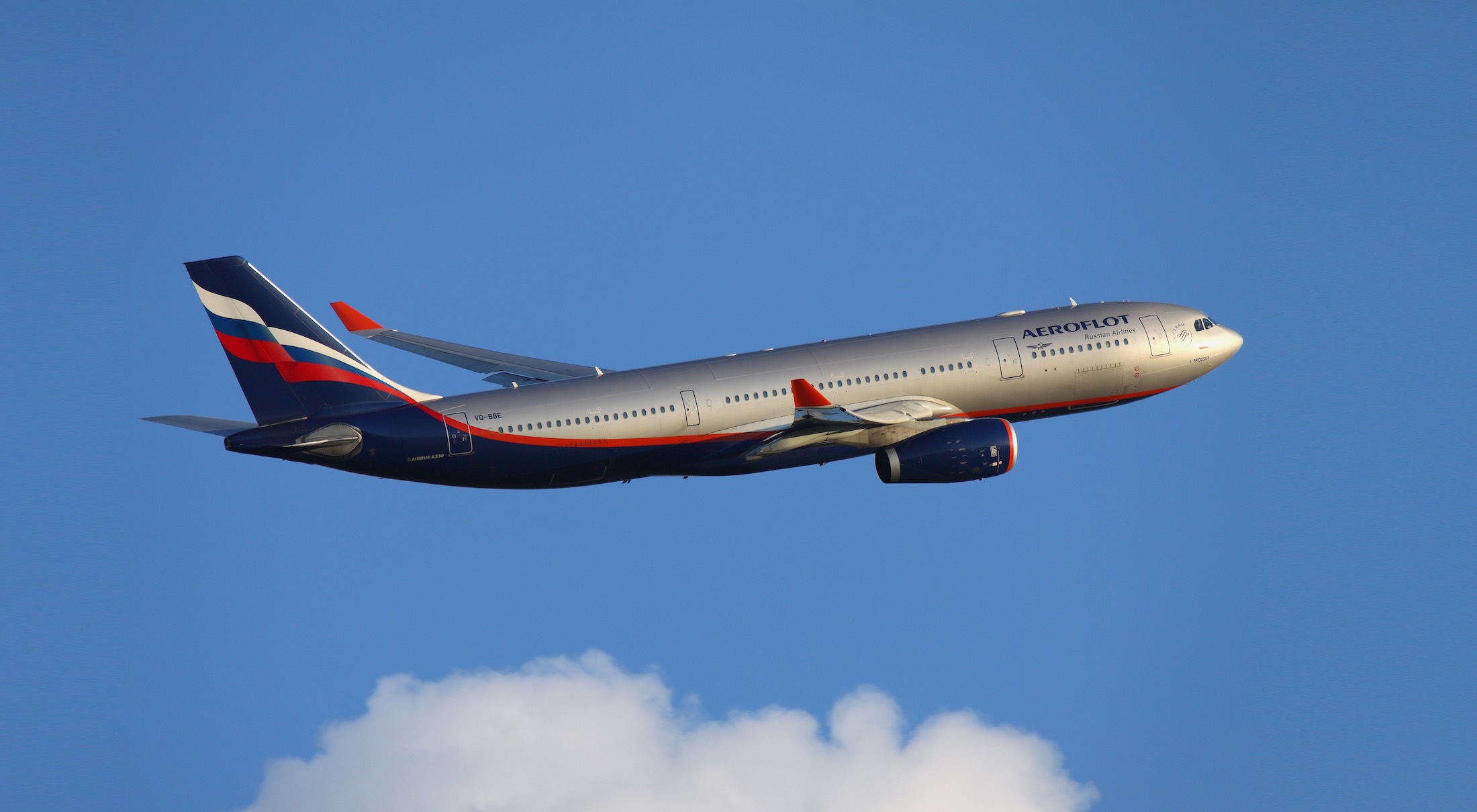
The Islamic Republic of Iran has stepped in as a vital lifeline for Aeroflot Russian Airlines, providing aircraft repair for an Airbus A330 jet. Oh, the irony.
Aeroflot Sends A330 To Iran For Maintenance Work
After the Russian invasion of Ukraine, western nations placed strict sanctions on the Russian Federation. Those included prohibitions on airline parts that presented a dangerous calculus: cutting off airlines like Aeroflot from parts would eventually render their fleets inoperable. How many passengers would that endanger in the meantime?
Aeroflot and other carriers responded by stealing leased jets, cutting off payments and re-registering them in Russia. From time to time deals were made, but hundreds of aircraft remain stolen and with the war now over a year old, likely permanently unable to return to service outside Russia due to inadequate maintenance records.
- King Vlad Annexes A Fleet of Stolen Jets Into The Arms Of Mother Russia
- Russian Airlines Decide To Just Keep Leased Aircraft…
- The Problems For Russian Airlines Are Just Beginning
- How Aeroflot Just Purchased Eight Airbus A330-300 Jets
In a move that is far more ironic than surprising, an Aeroflot A330-300 was tracked traveling to Tehran by Flightradar24. Asked about, Aeroflot issued the following statement:
“The maintenance of the Airbus A330 aircraft (in Iran) will be implemented by a provider for a wide range of work. The firm has all the necessary material resources, certificates and extensive experience, (while) the provider performs maintenance with a high quality level.”
The irony is that Iran itself is under intense sanctions and has been fighting to renew its fleet over the last decade. Iran must also smuggle in parts and clandestinely acquire aircraft (its latest fleet additions have represented South African or Armenian aircraft that have just “disappeared” over Iran).
So the country with strict sanctions against aircraft parts is providing servicing for a country with strict sanctions against aircraft parts. Where are the parts coming from? Sanctions are only as strong as their weakest link and with India, Turkey, Israel, and the Gulf States playing both sides in the Russian – Ukraine struggle, it would not surprise me if parts are flowing in from multiple nations.
CONCLUSION
Aeroflot has sent an Airbus A330-300 to Iran for maintenance work, an ironic sign of how weak the sanctions against the two nations actually are. On the one hand, I want to see the Aeroflot fleet remain airworthy in hopes it can return to international service after Russia loses the war. On the other hand, war will drag on if loopholes to sanctions are about as long as Persia.
image: Sergey Kustov




There is a long established network of suppliers for grey market parts with a variety of provenance throughout the Middle East and Central Asia. They are simply expanding their nets from Iran, Syria, Sudan, etc.. to the much larger Russian market as well. The Indias, Turkeys and Israels of the world don’t get involved with this kind of thing – it is mostly run out of UAE Free Zones and the CIS ‘stans.
Denial of technical support to civilian airliners compromises aviation safety and is not a justifiable action, notwithstanding the actions of the Russian military in Ukraine. In fact, as the Iran embargoes have demonstrated, they simply served to enrich the organised crime syndicates who run the grey market. I expect the corresponding people on the Russian side laughing all the way to the numbered accounts of their offshore banks.
They may be laughing but the reality is the parts are questionable and the technical support even more so. If any country questions the safety of these aircraft (given this fact you present as to the dangers) than the planes should be banned from their airspace. Period. Russia already has safety issues dating far back and long before sanctions, add in the fact that they are now having maintenance done by the equivalent of a guy living in the woods and fixing cars in his back yard then it’s on them to deal with. If one of these planes crashes in a populated area in India or the UAE and kills innocent people on the ground they have only themselves to blame for supporting pirated parts and shoddy maintenance.
For starters, expecting Russia to simply say “oh ok, we’ll just shut down our entire air transport network because you said so” is unrealistic, making the aviation safety sanctions less effective as a tool to achieve a political end than just political theatre that risks civilian lives.
Lets be honest here (I’m assuming you know how the “grey market” for parts actually works at least for Iran) – there is no significant loss of safety margins with regards to the grey market parts – these are SV/OH tagged parts often with FAA 8130s or EASA Form 1 who have tags swapped and EUC certification falsified. The “reputed” suppliers in this space have their own reputations so don’t play around with counterfeit parts any more than the official suppliers do. The Russian and Iranian regulators don’t want to see planes crash either. The Iranian guys are actually incredibly impressive with their deep technical knowledge of the aircraft they oversee and the creative solutions they have developed and implemented through the years – they are more knowledgeable about some older models like the 727 and the JT8D engines than even the guys still standing at Boeing or PW, and are getting up there with the early model A320s too. So no, I have no major doubts that this is not a particularly severe risk in itself. Where the safety margins are eroded is on the margins – MELs utilised to the maximum, extensions and escalations approved too often, software updates delayed, etc.. This is not a wild west where anythiong goes, but rather a pragmatic regulatory system within the constraints imposed on it.
I was more going on your idea that by imposing these sanctions we in turn jeopardize the safety of civil aviation. That is where I differ. Aviation is not a right, it’s a privilege. To buy planes from the world’s leading firms and to service them properly comes with the caveat that you are being a “good boy” on the world stage and not invading innocent neighboring countries as an attempt to extinguish its culture and people. Or in Iran’s case, destabilizing an entire region and funding terrorism across the world. To me, those countries, if they want to fly passengers, can do so with the idea that reasonable countries will not assist them in this. And if they choose “grey market” parts and ad hoc technicians for repairs, no other country should want them in their airspace and risking the lives of others. That’s the price you pay.
And sorry, I completely disagree on the technicians and engineers in Iran. While they may be fantastic working with 40 year old airframes and engines (much like the guy in the woods who fixes cars in his backyard is good at working on 1980 Hondas – but not on a Tesla) it does not translate to current and more modern aircraft. Software updates are as important and this is where I feel they are light years behind. And why we will soon see immense problems with accidents occurring in Russia and (I pray not) in other parts of the world that allow Russian aircraft into their airports.
The A320 is a 40-year old design now, just sayin’ 🙂
Some of the brightest Airbus guys I’ve worked with were from Iran and Syria. They are used to finding solutions because just ordering a new part is a luxury they don’t usually have, I don’t doubt Iran can do a decent job on 320 family CEO and even 330/340 maintenance. I wouldn’t put a NEO or 350 into shop there though, nor any Boeing product more recent than a 737 Classic.
Agreed, Original A320CEO are. However, what percentage of the Aeroflot fleet (as an example) is that old? Many I am certain are NEO models over the past 10 years. As well the engines have evolved. I highly doubt that the generation of aircraft delivered to Russian carriers new over the last 10 years are 100% in the wheelhouse of Iranian technicians and engineers. This is the period when (I believe) Aeroflot was on a shopping spree? I would venture that they may have parts and the ability to find illegal and aging technicians for roughly 20% of their fleet. Good. They can utilize them for what they deem as essential domestic service. But the reality is they won’t stop there. They will give them all to outsourcing in sketchy places like Iran and hope for the best. Which, in the case of those countries allowing them to fly passengers on these planes in their airspace, is egregious at best.
I respect your insight, always have, Sean, but on this you are coming across as being a bit less focused on the reality at hand and more on being a Russian sympathizer. But I have found that many in Africa lean that direction. Your position seems to be that Russian airlines should be treated with the same consideration as others purely in the name of aviation. Sorry, let’s agree to disagree. Again, aviation is not a right, it’s a privilege. If they can’t abide to basic International rules they can build more “incredible” Sukhoi jets and, on their own, risk passengers lives solely on domestic operations.
Let me add as well that a large percentage of these planes are now essentially “stolen.” So, basically, you have stolen aircraft which no one will (or can) insure, being flown by secondary pilots and maintained by secondary technicians (as many have been brought into military service or have fled the country) and are now being outsourced maintained using “grey market parts” with service in Iran whose technicians actual trained knowledge of aircraft kind of stopped in 2001. Yet, somehow, and why you triggered me on this, it’s our fault? That we are jeopardizing safety via sanctions? That we are supposed to adhere to a brotherhood of aviation and give them what they need to avoid needless lives lost? Perhaps THEY should have thought about this before they began murdering people in a country solely with the intent of conquest and integration into Russia.
Less of a Russian sympathiser than an Iranian one to be honest. Not a particularly big fan of either.
Even less a fan of sanctions though, and yes, many of us in Africa have that view for good reason.
For example, we in Malawi are just recovering from Cyclone Freddy which left over 500 dead and millions homeless. Yet vital aid and medical supplies provided from EU/UK sources were unable to be delivered to victims because the UN WFP helicopters performing the aid missions came from Russian contractors and were hence sanctioned from handling the aid. Are you trying to say that Malawians should suffer and die because of the sanctity of these sanctions that don’t even involve us? Sorry, but I won’t accept that as a valid argument. Blanket sanctions are counterproductive and often wind up causing unintended consequences.
Any action taken deliberately with the goal of reducing aviation safety for civilians is wrong. That includes both the actions by those who cut the corners, as well as those who force them into a position where cutting corners becomes necessary. The fact that it is Russia or Iran is less relevant than the principle.
From a perspective of Africa, blanket sanctions can seem harsh and unreasonable. Because everything directly and indirectly effects you. Be it grain, economic support, military, or aid during times of crisis. But one needs to also ask at what point Africa needs to begin to take some responsibility for itself. Not in a callous way, but to prevent an endless cycle of being an aid culture. The failures of Africa, much of it self imposed, some of it as a result of old colonial horrors, at some point has to stop blaming everyone else, and as a result put a wrench in the rest of the world in keeping check globally. As a Starbucks Barista once told me when I picked up the wrong coffee and said that it was not what I ordered, “It’s not all about you.”
From a European and American perspective (especially American) there is a point where you must ask, how much more do we have to give to get the same result over and over? And if Russia and China want to step into that void of aid, well, let them. They are welcome to the same mistakes. But how should their aggressions and clear desire to conquest, and form a new world order at the expense of innocent lives, affect our response to a continent that we have spent four decades trying to help and is still ripe with corruption, violence, and an inability to lift its people up as a result (not all of Africa…but you get the point).
As to your direct example, how many decades has Malawi, where my uncle served for years in the U.S. State Department, had to prepare for natural disasters? How much money has Malawi been given during that time? And even aid still comes as you say with your complaint being that Russian helicopters can’t fly the missions? Perhaps money spent on infrastructure and planning so as to be less reliant would have been the solution. Not to armchair quarterback, but you get the point.
I’m sorry people are suffering there. But I doubt those people now homeless even have a clue of the suffering that Russia is imposing on Ukraine. That’s the danger of an aid culture, they never see the needs elsewhere. Essentially Ukraine is headed down the same path (sadly) and the cycle continues elsewhere. That is until we stop this madness once and for all and prove that tyranny and conquest in the world has no place in modern times.
As to the rest of your comment? You offer complaints. But what is your solution? What other alternative do you see other than to completely and without restraint sanction a country whose people have learned to love having money and a good Louis Vuitton bag more so than the lives of innocent people in an independent and free nation? If we don’t hurt the Russian people they will never rise up. They love their Louis Vuitton (a lot more than helicopter aid to Malawi) and it’s only through their pain that a maniac will be taken out.
We are dangerously taking this discussion down a route that is diverging from the aviation aspect now, but I will say it has been fun having a civilised debate with someone that has educated, yet differing viewpoints. Not a common experience on the interwebs.
Sean, agreed. I enjoyed the rarity of having a civil and reasonable debate on what is a complex topic. Though we disagree on certain areas here there is no doubt I have respect for you based on the many comments I have read over the years pertaining to Africa and the aviation industry there.
stfu Russia is innocent
Innocent by invading a sovereign country becuase lidl Vlad has size issues? Tell that to the dead Ukranians.
Love to see it.
*reply to Sean about educated civilized conversations
The leaked documents this week are telling and don’t necessarily support Russia losing at this moment. They state Ukraine’s military will fall “well short” of reclaiming the territory it’s lost so far to Russia, according to a document seen by the Washington Post.
Also, Ukraine pursued drone attacks inside Belarus and Russia. Ukraine promised the U.S. it would not strike Russia. Then it went against U.S. and Western wishes and attacked a Russian plane in Belarus, and days later Ukraine sent drones to target a gas facility near Moscow, say the documents. Also, leaders in Kyiv have considered further targets outside Ukraine.
Now they’ve altered their plans: ‘Ukraine says it has been forced to alter its counter-attack plans after U.S. intelligence leak revealed top secret military details – as Russia starts ‘scorched earth’ bombing of Bakhmut’
Andrea Mitchell questions Blinken: U.S. officials are doing damage control after intelligence documents were leaked, revealing sensitive information such as the U.S. assessing Ukraine will fall “well short” of retaking territory it lost:
https://www.youtube.com/watch?v=g8V6SXCLFEE
On a more positive note, glad to see the POW swap. Russia and Ukraine confirmed Monday over 200 servicemen have returned home in a prisoner swap. Russia’s Defense Ministry said 106 Russian servicemen have returned from Kyiv territory and will receive medical and psychological treatment in Moscow. Andriy Yermak, Head of the Office of the President of Ukraine, reported 80 male and 20 female Ukrainian soldiers have been released from Russia.
Also interesting in the docs is the seemingly more accurate Russian death toll:
Top secret US documents that have been leaked to the public show that corporate media is blatantly lying about the level of death and overall casualties experienced by Russian military forces in their special operation in Ukraine and that the US government is using artificially low numbers provided by the Ukrainian government to cover up that nation’s true battlefield death tolls.
The Ukraine leak represents the largest US intelligence leak since a decade ago, when computer intelligence consultant Edward Snowden proved to the world that the United States government was spying on its own citizens, under the guise of national security. Now, the leak of intelligence documents pertaining to the Russo-Ukrainian War proves that the United States government, in concert with corporate media, is lying to its citizens in an apparent effort to drag out the war in Ukraine and pump up artificial support for it at home.
While countless corporate media reports in the United States and the wider NATO world have claimed that Russian forces have lost a whopping 200,000 men since the special military operation in contested regions of Ukraine kicked off last year, US intelligence reports put the figure around 43,000.
While dispelling the outlandish media reports on Russian casualties, the leaked intelligence documents parrot the Ukrainian military death tolls claimed by that nation’s government, which say they’ve lost just 17,500 men.
Tragically, these figures are far from reality. Ukrainian soldiers and observers of the Ukrainian war effort have reported multiple times since the conflict heated up last year that the Ukrainians have been ordered NOT to retrieve the bodies of their fallen comrades so that the fallen men won’t be officially reported as military deaths, keeping the figures artificially low. As a result, thousands of Ukrainian fighters are thought to have been buried in mass graves.
–now if we could get the truth on Nord Stream.
Corporate media lying?? That’s news to me.
Right?? I was in complete shock and disbelief myself
I find this one hard to believe. This type of stuff really makes me wonder if this really is all a movie.
A security scare shadowed President Biden’s trip to Northern Ireland on Wednesday after a top-secret document containing the itinerary for his visit to Belfast and information about his protective detail was found in the street.
A passerby discovered the police paper, which detailed where the president was staying in Northern Ireland as well as the phone numbers of the Police Service of Northern Ireland officers in his security detail, BBC Radio Ulster reported.
https://nypost.com/2023/04/12/top-secret-document-about-bidens-belfast-visit-found-on-the-street
Institute for the Study of War conflict map as of yesterday:
https://i.postimg.cc/HWtLjq9q/Screen-Shot-2023-04-12-at-11-48-01-AM.png
Concerning the leased aircraft that have been effectively stolen, do manufacturers not install some anti theft mechanism buried in some system? ( like a kill switch). While aircraft are not often snatched because difficulty in registration etc, perhaps this feature was not considered necessary? Until now
So you’d rather see the sanctions fully imposed so that civilians can fly aircraft that are unairworthy?
I dont know… I like this website for air travel related content. Political content, however well intentioned, is not necessary as far as I am concerned.